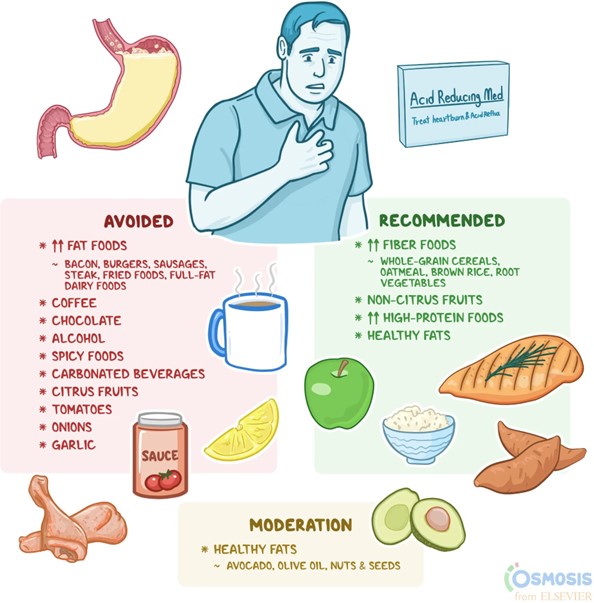A nurse is teaching a client who reports wanting to lose weight about behavioral modifications. Which of the following statements should the nurse include in the teaching?
"Make sure to drink water with your meals."
"Your biggest meal of the day should be breakfast."
"Meal replacement shakes can cause weight gain."
"Set your weight loss goal to 2.5 pounds per week."
The Correct Answer is A
According to some sources, behavioral modifications for weight loss include:
● Keeping a food journal to track your intake and identify patterns
● Eating smaller portions and using smaller plates
● Filling half of your plate with fruits and vegetables
● Getting plenty of sleep and drinking fluids
● Eating slowly and consciously
● Eating breakfast every day
● Avoiding high-calorie add-ons such as cream, butter, mayonnaise and salad dressings
● Not eating while watching television, reading, working or doing other activities
● Planning healthy snacks and meals in advance and bringing them to work
● Replacing eating with another activity that you will not associate with food
Based on these suggestions, the statement that the nurse should include in the teaching is “Make sure to drink water with your meals.” This can help you feel full and hydrated, and reduce your calorie intake from other beverages.
The other statements are either false or not related to behavioral modifications. For example:
● Your biggest meal of the day should be breakfast. This is not a behavioral modification, but a dietary recommendation that may vary depending on your preferences and needs.
● Meal replacement shakes can cause weight gain. This is not a behavioral modification, but a claim that is not supported by evidence. Meal replacement shakes can be part of a weight loss plan if they are used appropriately and provide adequate nutrition.
● Set your weight loss goal to 2.5 pounds per week. This is not a behavioral modification, but a goal that may be unrealistic or unhealthy for some people. A more reasonable goal is to lose 1 to 2 pounds per week.
Nursing Test Bank
Naxlex Comprehensive Predictor Exams
Related Questions
Correct Answer is A
Explanation
The nurse should identify the statement "I like to drink a glass of warm milk before bed to help me sleep" as a contributing factor to gastroesophageal reflux disease (GERD). Consuming a glass of warm milk before bed can worsen GERD symptoms due to its high-fat content. High-fat foods, including dairy products, can relax the lower esophageal sphincter (LES) and delay gastric emptying, allowing stomach acid to flow back into the esophagus, leading to symptoms of GERD.
"I try to follow a low-fat, high-protein diet to help me maintain my weight": Following a low-fat, high-protein diet is actually beneficial for managing GERD. High-fat foods can worsen GERD symptoms by relaxing the LES and delaying gastric emptying, while a low-fat diet can help reduce symptoms.
"I stopped drinking caffeinated beverages several weeks ago": Avoiding caffeinated beverages is a positive step in managing GERD. Caffeine can stimulate acid production in the stomach and relax the LES, contributing to GERD symptoms.
"I have recently stopped drinking alcohol": Stopping alcohol consumption is also beneficial for managing GERD. Alcohol can relax the LES and increase acid production in the stomach, leading to GERD symptoms.

Correct Answer is A
Explanation
Folate, also known as vitamin B9, is an essential nutrient during pregnancy as it plays a crucial role in the development of the baby's neural tube. When teaching a client about increasing folate in their diet during pregnancy, it's important to recommend foods that are rich in this nutrient.
1/2 cup cooked asparagus: Asparagus is a good source of folate, and 1/2 cup of cooked asparagus contains approximately 134 micrograms of folate.
1/2 cup plain low-fat yogurt: While yogurt is a healthy food choice, it is not a significant source of folate.
1 medium apple: Apples are generally low in folate content and not considered a rich source of this nutrient.
1 small banana: Bananas are also not known for their folate content and do not provide a significant amount of this nutrient.
Given the options provided, 1/2 cup cooked asparagus is the best source of folate. It is important to note that other food sources rich in folate include dark leafy greens, legumes, fortified cereals, and citrus fruits. Encouraging a varied and balanced diet that incorporates these folate-rich foods can help ensure adequate folate intake during pregnancy.
Whether you are a student looking to ace your exams or a practicing nurse seeking to enhance your expertise , our nursing education contents will empower you with the confidence and competence to make a difference in the lives of patients and become a respected leader in the healthcare field.
Visit Naxlex, invest in your future and unlock endless possibilities with our unparalleled nursing education contents today
Report Wrong Answer on the Current Question
Do you disagree with the answer? If yes, what is your expected answer? Explain.
Kindly be descriptive with the issue you are facing.
